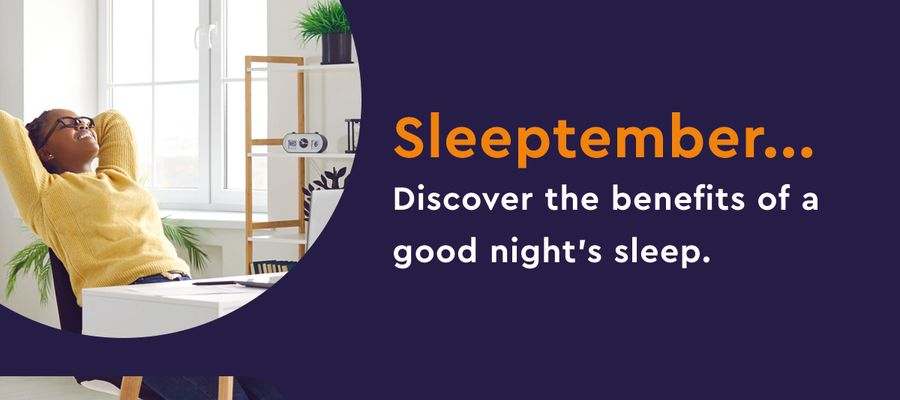As the leaves start to change their colour this September, we're reminded of the significance of 'Sleeptember'. This month isn't just about the transition of seasons; it's a dedicated period to delve deeper into the importance of sleep. But what exactly makes sleep so crucial?
Beyond its restorative benefits, it can shape our productivity and decision-making in our professional lives! Join us as we uncover the profound influence of sleep on our daily work routines and overall well-being.
Why Sleep Matters
Rest isn't merely a break; it's a lifeline. It's as fundamental as the meals we consume and the air that fills our lungs. Shockingly, a significant portion of us are not catching enough Z's, averaging a mere five to six hours nightly.
This sleep deficit impacts not only our physical state but also our cognitive and emotional well-being. Imagine investing time in a balanced diet and regular workouts; without adequate sleep, those efforts might not yield the desired results.
Sleep Shortage in the UK
As the hustle and bustle of modern life continues to accelerate, many are sacrificing on sleep. While the consequences of this trade-off might not be immediately evident, the long-term implications on health and productivity across the UK are profound.
A study by The Sleep Charity revealed that nearly two-fifths of the UK population barely manage six hours of sleep each night. To put this into perspective, individuals aged up to 64 typically need between 7 to 9 hours of sleep per night.
Just last month, when asked how the UK rates their sleep quality, a mere 5.2% of respondents awarded their sleep the highest rating of five, whereas close to 20% rated it at a lowly 1-2.
It's no secret that these subpar sleep ratings inevitably impact productivity and well-being in the workplace.
Sleep's Role in Professional Life
A rejuvenated worker is an asset. Sleep scarcity can cloud judgment, hinder concentration, and dampen spirits. Over time, chronic sleeplessness can pave the way for severe health complications, including cardiovascular diseases, diabetes, and more. In a corporate setting, this can mean reduced output, increased errors, and strained team dynamics.
Finding Calm After the Workday
In our tech-savvy era, truly 'logging off' post-work is easier said than done. Beyond work emails, the allure of social media and other online distractions is ever-present. Prolonged exposure to the blue light from our devices then suppresses melatonin, our sleep hormone, making restful nights harder to achieve.
So, how can one ensure quality rest?
Rhythmic Rest: By setting a consistent sleep schedule, you're training your internal clock to expect sleep at a certain time each day. This can lead to faster sleep onset and higher-quality rest. Aim to keep the same bedtime and wake-up time, even on weekends. Over time, you might even find you no longer need an alarm clock!
Digital Detox: In our hyper-connected world, it's tempting to bring our devices to bed. However, by designating the bedroom as a tech-free zone, you're not only reducing your blue light exposure but also mentally separating work and relaxation spaces. Consider introducing a 'screen curfew' an hour before bed, allowing your mind to unwind naturally.
Dietary Discipline: What we consume can significantly impact our sleep. While caffeine and alcohol might be tempting, they can play havoc with your slumber. Instead, try unwinding with a soothing chamomile tea or comforting warm milk in the evening. Also, avoid heavy or spicy meals close to bedtime; they can cause discomfort and indigestion.
Soothing Strategies: Preparing your mind and body for sleep can make a world of difference. Engage in activities that help you relax and signal to your body that it's time to wind down. This could be reading a book (preferably a physical one to avoid blue light), practising deep breathing exercises, or even indulging in some gentle yoga or meditation. These activities can reduce stress and anxiety, making it easier to drift off.
Optimal Ambience: Your sleep environment also plays a pivotal role in the quality of your rest. Ensure your bedroom is cool and dark, using blackout curtains if necessary. A quiet space is crucial, so consider earplugs or white noise machines if you live in a noisy area. Lastly, invest in a good mattress and pillows that support your body's natural alignment, and remember to replace them regularly.
The Power of Restful Nights
As 'Sleeptember' unfolds, let's not just acknowledge sleep but truly prioritise it. Beyond personal well-being, it's a cornerstone for professional excellence.
A well-rested person isn't just happier and healthier; they're also more productive and focused. Cheers to rejuvenating sleep and the success it brings!

